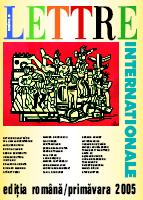Pamantul se cutremura
The Earth is Quaking
Author(s): Adrian MihalacheSubject(s): Cultural Essay, Political Essay, Societal Essay
Published by: Institutul Cultural Român
Keywords: natural disasters; Voltaire; Leibniz; Rousseau; Rilke; Pope; ecologists; James Lovelock; Gaia; Bjorn Lomborg.
Summary/Abstract: Man has always tried to explain natural disasters. Before modern times, they were thought to be punishments for man’s sins. In the Modern Age, the catastrophic imagery can no longer be associated simply with moral legends. The 1755 earthquake in Lisbon killed not only “sinners”, but also children. Having long been confronted with the contradiction between God’s almightiness and infinite kindness on the one hand, and the persistence of Evil in the world, on the other hand, , philosophers tried to find rational explanations. Voltaire accused Providence. Leibniz and Pope thought that good prevailed in the Universe while Evil was perceived as intolerable only from the perspective of a partial view of the world, man being the source of Evil. Rousseau thought that man had been corrupted by civilization, therefore it was not nature’s blind forces that had caused the disaster in Lisbon, but Man. Nowadays, Reason tries once again to make spectacular climatic fluctuations and disastrous earthquakes comprehensible, which means either acceptable or avoidable. But despite the three centuries’ long supplementary rational intellectual exercise, we think in the same way as Leibniz, Pope, Rousseau, Voltaire or the superstitious anonyms before them. While cybernauts invoke occult forces, ecologists base their discourse on the same pre-modern notion of disaster as punishment for the sin of having abused nature. Bjorn Lomborg brings scientific evidence that global heating is a cyclic process, regardless of man’s actions. The same line of reasoning is followed by James Lovelock and his hypothesis Gaia, according to which the Earth is a biological-geological self-adjusting unity, similar to a being, ever evolving but never multiplying itself. In the alternative ecological discourse, man has a modest, marginal position in nature’s larger picture, a notion similar to Leibniz, Pope and Rousseau'’, and later to von Humboldt’. Disaster is a drastic reply to mankind’s aggression against nature,. It is not Divinity but Nature who punishes the hybris of the human species.
Journal: Lettre Internationale - Ediţia română
- Issue Year: 2005
- Issue No: 53
- Page Range: 75-78
- Page Count: 4
- Language: Romanian

